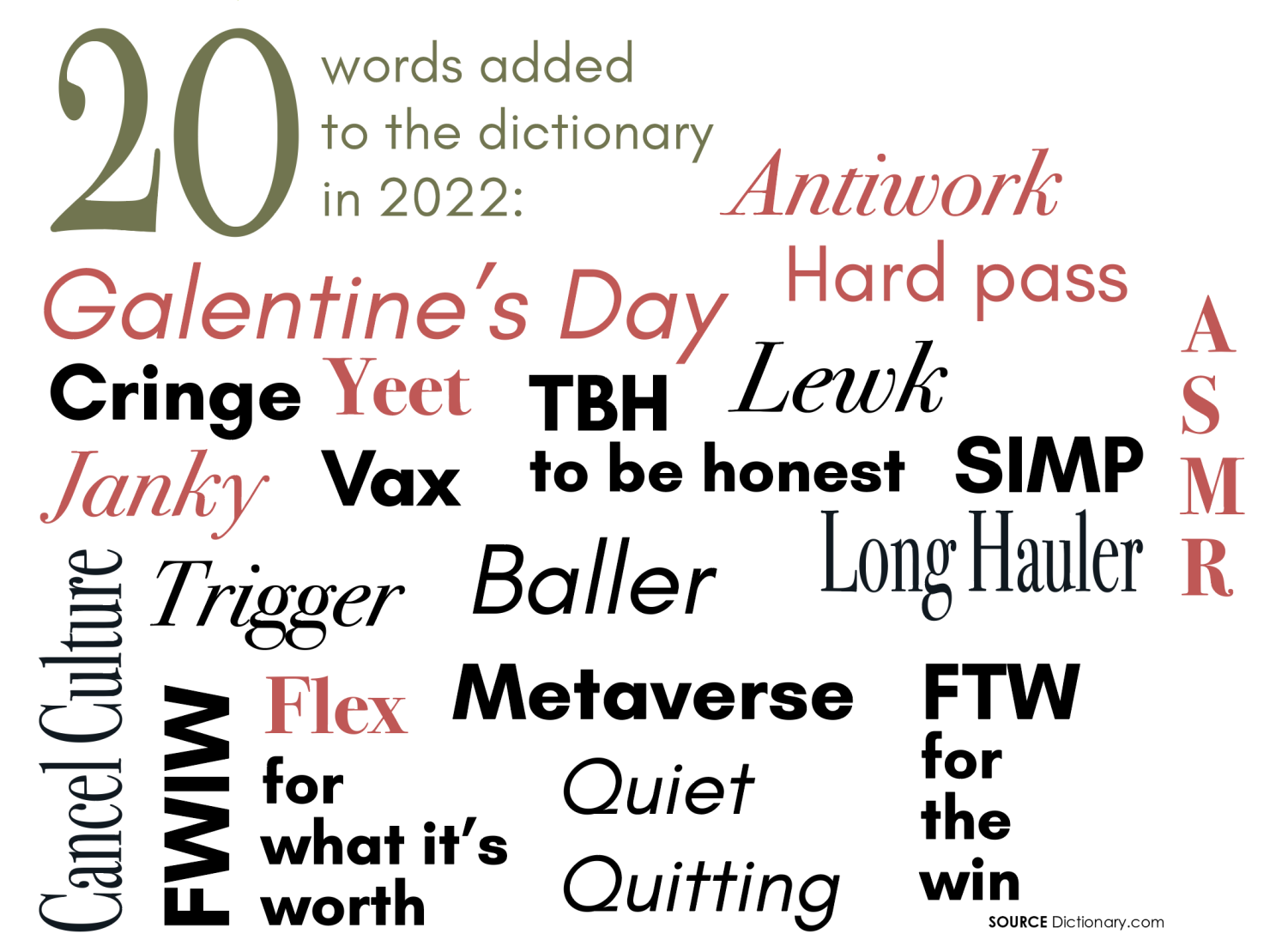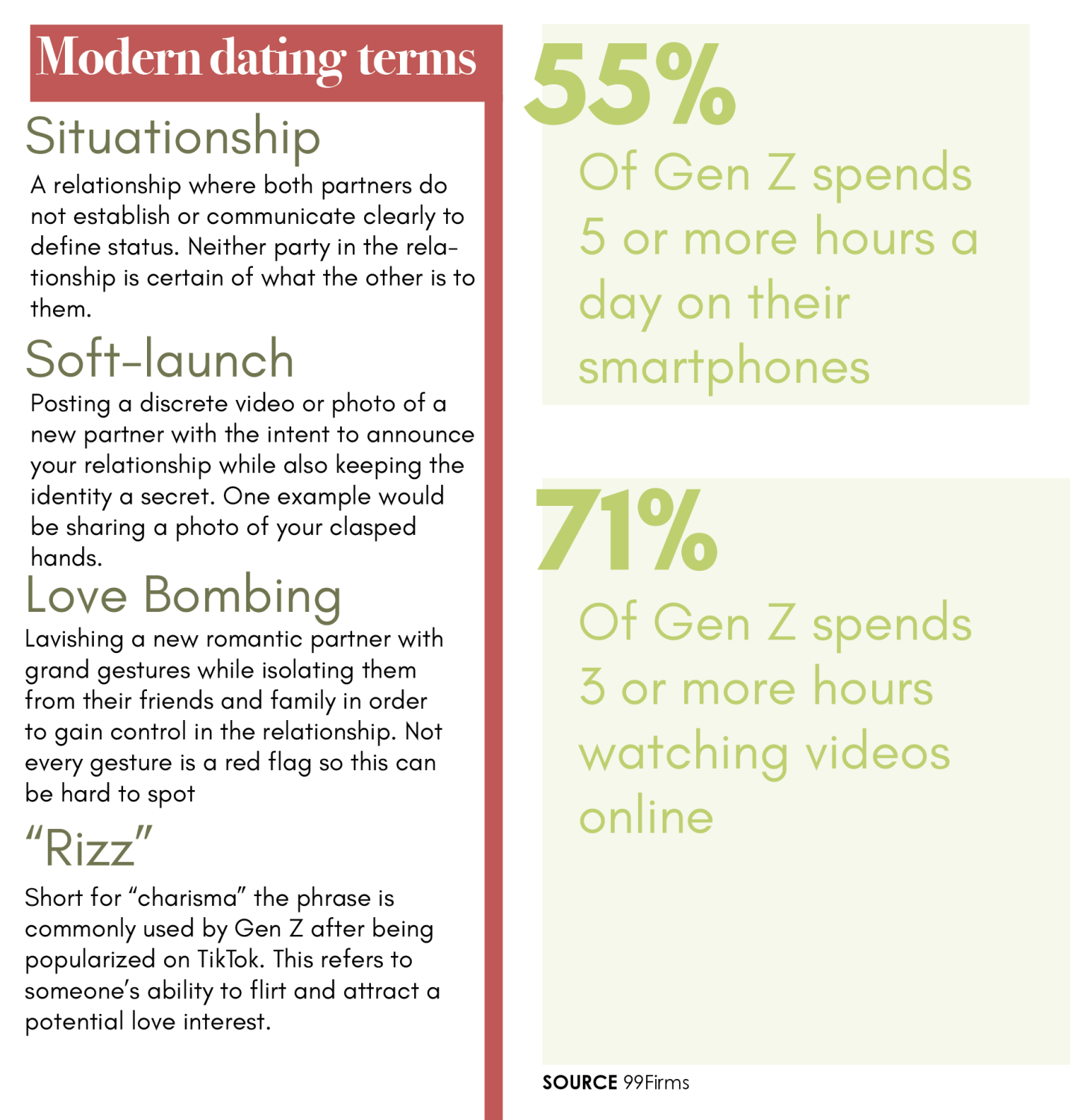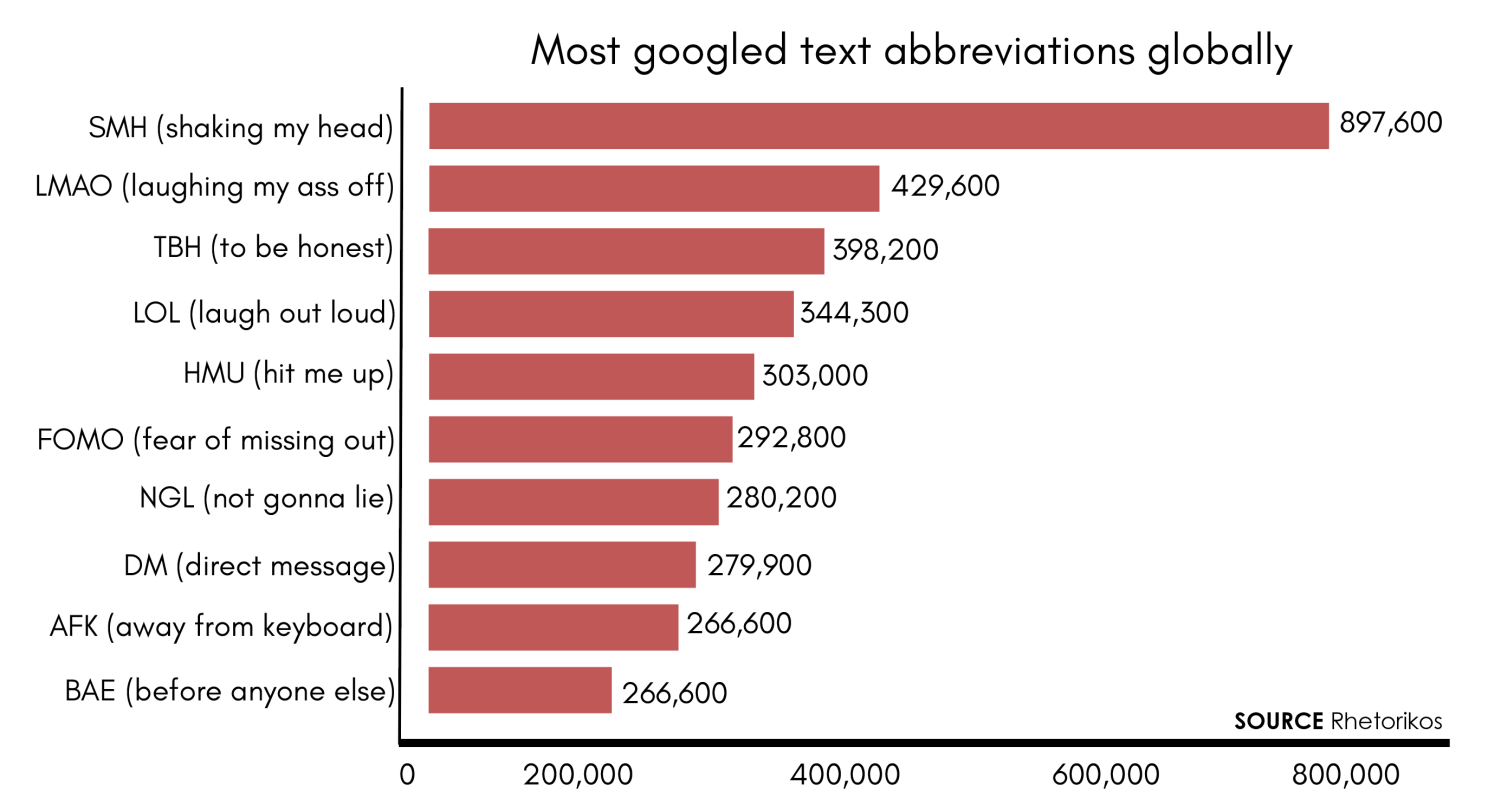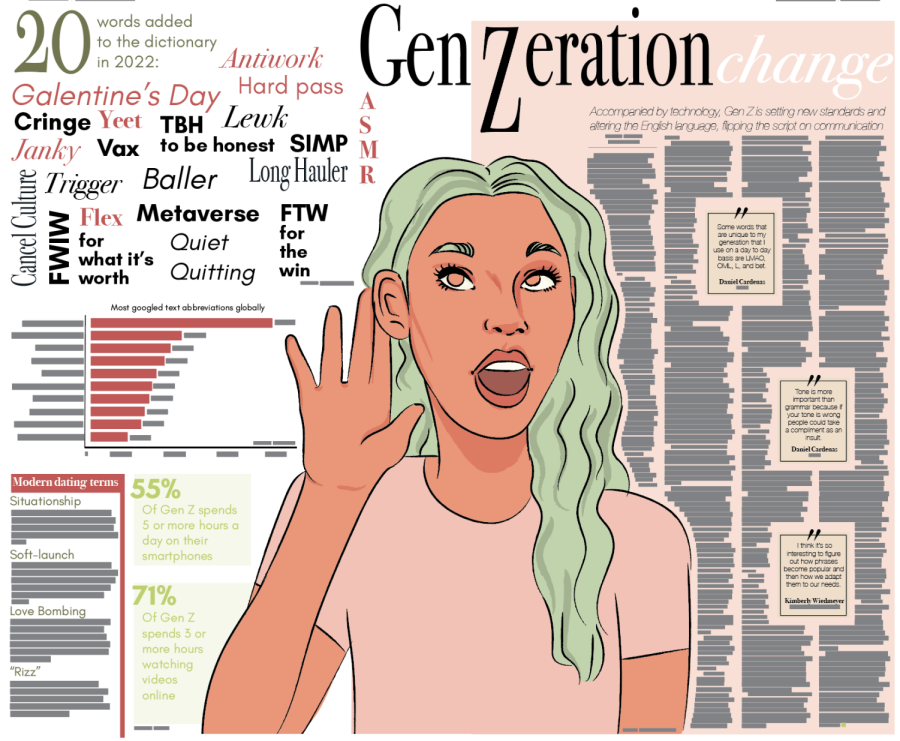GenZeration change
Accompanied by technology, Gen Z is setting new standards and altering the English language, flipping the script on communication
What’s said online has become its own category of communication. As generation Z grew up with the rise of the internet, its imprint could have lasting effects on the way we traditionally use vocabulary.
March 10, 2023
Carving out their own vocabulary and bypassing outdated means of communication, Generation Z fosters change through technology adding one new word to the dictionary at a time.
Over time, the internet has become a place where many cultivate new relationships and form new concepts. For Gen Z, which comprises any one born between 1997 and 2012, one popular place where this communication and interaction happens is TikTok. According to Forbes, over 60% of TikTok’s users are Gen Z, meaning 60% of its users could be picking up the same habits and languages.
“Most of Gen Z is really wrapped around TikTok,” freshman Gianna Gonzalez said. “I think the main thing is that Gen Z gets their personality from the app. I feel like anything that’s popular on TikTok, my generation just runs with it.”
Through apps like TikTok, new terms are often introduced, but the app’s algorithm helps them to go viral. Gen Z’s adaptation of new terminology on the app could replace the slow spread of language by word of mouth through instantaneous sharing and imitation. Gonzalez provides reasoning to why this generation could be interconnected.
“I feel like Gen Z is wrapped around other people’s opinions,” Gonzalez said. “We want people to have good opinions about us and we want to fit in rather than stand out. So, I feel like whatever’s on TikTok and whatever’s trending everyone will do anything they can to fit in.”
Many linguists believe that Gen Z is hurting the English language. Because of the internet, new words are made each day and are seeping into conversations and standard English. UT OnRamps Rhetoric teacher Kimberly Wiedmeyer reflects on how she sees new language enter her classroom.
“I learned what one word meant and then tried to use it and my students laughed at me,” Wiedmeyer said. “They’re like, ‘nobody says that anymore, stop saying that Mrs. Wiedmeyer.’”
The turnover of popular phrases as older generations try to understand could cause a miscommunication and lack of understanding between all age groups. This could lead to further resentment between generations.
“We have to try our best to communicate,” AP literature teacher Judd Pfeiffer said. “We need patience, empathy, and understanding. My parents and their friends use the internet, and certainly use social media, way more than I do, so it’s not always about younger people communicating differently because of the internet. Maybe we can avoid misunderstandings by talking in person more. So much of in-person communication is non-verbal, a lot is lost when the majority of our communication is online.”
Online communication and overall writing on the internet has become its own distinct genre with its own rules and mannerisms. According to, The Guardian, understanding emotion through writing is becoming a fundamental skill.
“I think that’s really interesting because I often feel that kids know all caps mean screaming, but my mom doesn’t,” Wiedmeyer said. “When she texts in all caps I’m like are you yelling at me mom? So I don’t know if these rules are universal yet. And the other thing that I often think about is like, and I’ve read articles about having a font for sarcasm because how do you connote that and oftentimes this is lost in text messages. It’s an interesting thing to think about, like should we teach text to speak over something like cursive which is now dead.”
As an English teacher, Pfeiffer sees the repercussions of this new way of talking online with his students.
“I have no problem with this when we are writing direct messages, texts, or informal emails, but my students sometimes struggle to turn this off when they are writing formal essays, assessments, or letters,” Pfeiffer said. “We have to remember that punctuation and grammatical rules still matter when it’s formal writing and during standardized testing. That being said, it’s often hard to express tone when typing, so people try to express tone by manipulating punctuation.”

According to Rhetorikos, many worry that the internet may have an unnatural effect on English. Nontraditional words and writing styles being created could be seeping into our day-to-day speech.
“Students are so used to texting and typing informally, that they develop lazy and bad habits,” Pfeiffer said. “Students struggle with easy stuff like apostrophes, subject-verb agreement, pronoun case, and idioms involving prepositions more than ever before. It’s frustrating, because I truly believe my current students are incredibly intelligent; we just have to learn to make the switch when we are writing in a formal manner.”
When it comes to talking to others online, the range of textual innovation and expression that someone can find on Tumblr, Twitter, or even TikTok brings a loaded meaning to three dots ellipsis, at the end of a statement or a question without a question mark, or even “idk lol.”
“I feel like tone is very important because there’s certain ways that people can say things that are received differently,” Gonzalez said. “For example, someone could be like, ‘What are you doing,’ or ‘hey what are you doing?’”
According to Gonzalez, when it comes to communicating over social media students can say whatever they want to say, even harmful things that a person would never say to someone’s face. She feels as if because the generation is so wrapped around technology it gives people the power to hide behind a screen.
“I think we have to be more careful than ever before,” Wiedmeyer said. “I think that sometimes words that we want to claim as our own to use, we are checked more about “Well should we be saying that? Why do I need to say that word and claim it as my own? And we talked about that in Rhetoric classes, especially in words regarding your identity and how you can say it and who should say it. Why do I feel the need to say it? I think all those things are much more pronounced than they used to be 10, 20, or 30 years ago.”
What’s said online has become its own category of communication. As generation Z grew up with the rise of the internet, its imprint could have lasting effects on the way we traditionally use vocabulary.
“I’m not sure how much the internet is changing the rules, but they are certainly changing,” Pfeiffer said. “For example, it is now acceptable to use the word ‘literally’ to emphasize an exaggeration. That used to be the literal opposite of how this word should be used. ‘That soccer player is always injured. He is literally made of glass.’ This is now okay. That’s crazy to me. Is the internet to blame? Maybe. I saw ‘literally’ used in this manner more on the internet than I ever did before. Whatever the cause, our grammatical rules are certainly changing and becoming more relaxed and informal.”
Gonzalez reflects on how she talks to others is different to how she talks to them on the internet.
“It’s mainly just abbreviations and shortening things,” Gonzalez said. “You would never say “OMG” in person. If anything I mainly use slang over text.”
According to Rhetorikos, In order for English to remain useful and help communication, it needs to adapt to its current speakers’ habits. Pfeiffer explains how he’s since a shift from his generation to Gen Z.

“We didn’t use as many conventions and acronyms to shorten what we were saying, like “FYI” replacing “for your information,’” Pfeiffer said. “We just said the actual words. But we had our own way of speaking that was influenced by music, film, and other media forms just like y’all.”
Historically, shifts in language can happen over time. While the internet has sped up these shifts, it’s not necessarily new. According to Pfeiffer, modern English was becoming less formal before the internet began changing most aspects of our lives. Reading letters from the 19th century can show how formal everyday speech was.
“I do think the internet has made our speech more casual and economical,” Pfeiffer said. “But English is always changing, and that’s not a bad thing. Now, we (usually) no longer use dehumanizing language to describe groups of people. In that way, our language changing is a good thing. I think the internet has helped spread information that has made our language more inclusive. For example, we now use gender neutral pronouns more often. Instead of saying “he or she”/ “his or her”, we say “they”/ “their” even when the antecedent is singular. That’s a great thing.”
Gen Z and the power of the internet have gone hand in hand creating change, for better or for worse. New words enter our dictionary and the generation takes previous words and creates a whole new meaning.
“I think we’re realizing that as long as you can understand what’s being said, contractions, leaving letters out are going to continue happening,” Wiedmeyer said. “I think there are some English teachers that are horrified by that. I think there are some teachers that are looking at English as something that is living and breathing and changing to meet our needs. But at the end of the day we are all still reading and we are still writing. The venue is just different.”









